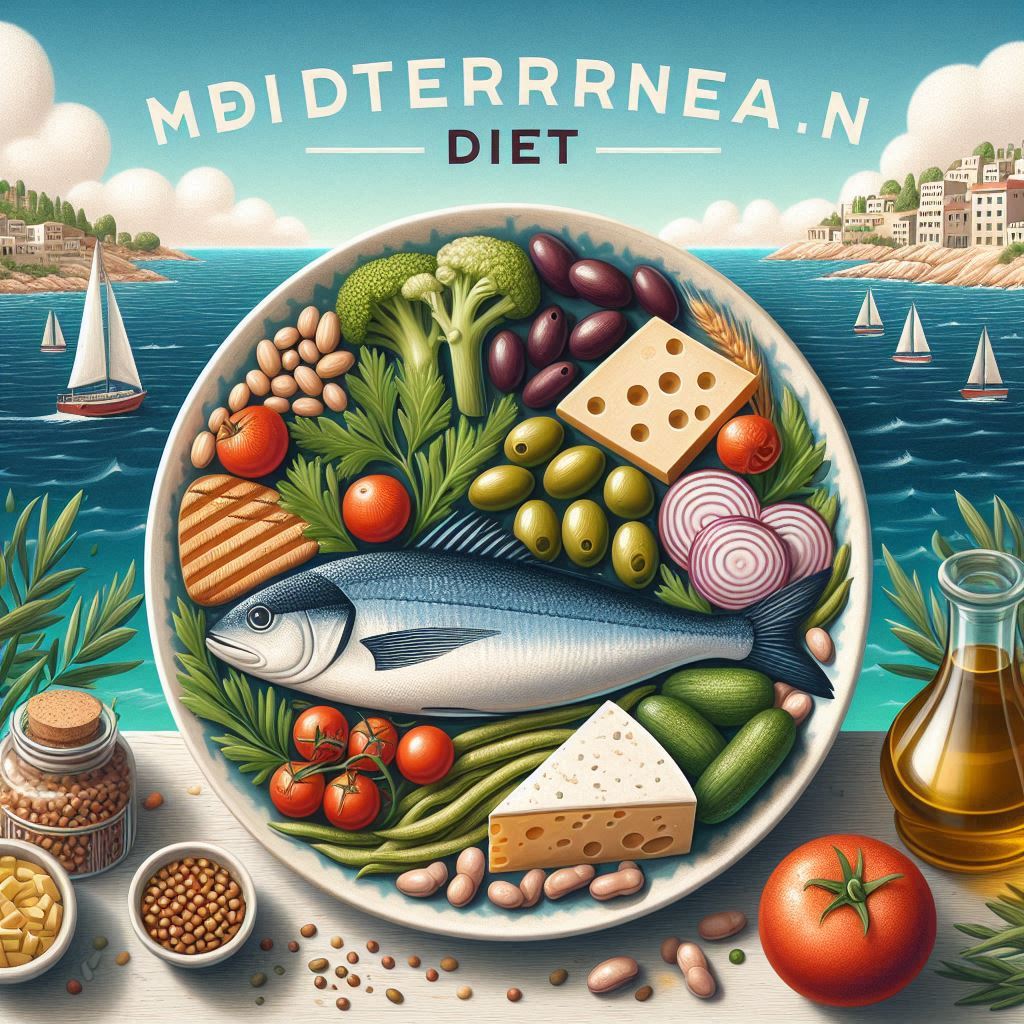The Mediterranean Diet: A Pathway to Long-Term Health

The Mediterranean diet is not just a diet but a way of life that has been practiced for centuries by people living in countries bordering the Mediterranean Sea, including Greece, Italy, and Spain. This eating pattern is renowned for its numerous health benefits and is often recommended by nutritionists and health professionals worldwide. The diet emphasizes whole foods, particularly plant-based foods, healthy fats, and lean proteins, which are consumed in a balanced and sustainable manner. Unlike many modern diets that focus on restriction, the Mediterranean diet promotes a lifestyle of abundance, variety, and enjoyment, making it not just a diet, but a sustainable way to live.
The Core Principles of the Mediterranean Diet
The Mediterranean diet is built on several key principles that make it both nutritious and enjoyable. Understanding these principles is crucial for anyone looking to adopt this way of eating.
- Emphasis on Plant-Based Foods:
- The Mediterranean diet places a strong emphasis on fruits, vegetables, whole grains, legumes, and nuts. These foods are rich in essential nutrients, including vitamins, minerals, antioxidants, and fiber, which contribute to overall health and well-being.
- Healthy Fats are Key:
- Unlike many diets that shun fat, the Mediterranean diet embraces healthy fats, particularly those from olive oil, nuts, and seeds. These fats are rich in monounsaturated and polyunsaturated fats, which are beneficial for heart health and help to reduce inflammation.
- Moderate Consumption of Lean Proteins:
- Protein in the Mediterranean diet comes mainly from fish and seafood, with a moderate intake of poultry, eggs, and dairy. Red meat is consumed sparingly, and processed meats are avoided.
- Limited Intake of Refined Sugars and Processed Foods:
- The diet minimizes the consumption of refined sugars, sweets, and heavily processed foods. Instead, it focuses on whole, natural foods that provide sustained energy and nutrition.
- Regular Physical Activity:
- The Mediterranean lifestyle is not just about what you eat but also about staying active. Regular physical activity, whether it’s walking, cycling, or other forms of exercise, is a crucial component of this lifestyle.
- Social and Enjoyable Eating:
- Meals in the Mediterranean diet are often a social event, enjoyed with family and friends. This social aspect of eating is believed to contribute to better mental and emotional health.
These principles are rooted in the traditional eating patterns of Mediterranean cultures, where food is not just fuel, but a central part of social and cultural life. The diet’s focus on whole foods and plant-based ingredients aligns with modern nutritional science, which increasingly recognizes the importance of these elements in promoting overall health.
How Does the Mediterranean Diet Work?
The Mediterranean diet works by promoting a balanced intake of macronutrients (carbohydrates, fats, and proteins) while focusing on nutrient-dense, whole foods. The diet’s effectiveness is largely attributed to its anti-inflammatory and antioxidant-rich foods, which are known to combat chronic diseases such as heart disease, diabetes, and certain cancers.
- Nutrient Density:
- The diet is rich in vitamins A, C, E, and K, which are essential for maintaining immune function, skin health, and overall vitality. Minerals such as magnesium, potassium, and calcium support bone health, cardiovascular function, and muscle performance.
- Heart Health:
- The diet’s emphasis on healthy fats, particularly from olive oil and fish, helps reduce bad cholesterol levels (LDL) and increases good cholesterol (HDL). This balance is crucial for maintaining heart health and preventing cardiovascular diseases.
- Blood Sugar Control:
- The diet’s focus on whole grains and fiber-rich foods helps regulate blood sugar levels and prevent spikes, making it an excellent choice for individuals with or at risk of type 2 diabetes.
- Weight Management:
- The Mediterranean diet promotes a healthy weight by encouraging a balanced intake of food, regular physical activity, and mindful eating practices. The diet is not about calorie counting but rather about making healthier food choices that lead to natural weight control.
- Longevity:
- Studies have shown that people who follow the Mediterranean diet tend to live longer, healthier lives. The diet’s combination of nutrient-rich foods, healthy fats, and active lifestyle contributes to reduced mortality rates from chronic diseases.
Getting Started with the Mediterranean Diet
Adopting the Mediterranean diet doesn’t require a drastic overnight change. Instead, it can be implemented gradually, allowing for a more sustainable transition. Here are some steps to get started:
- Increase plant-based foods: Begin by adding more fruits and vegetables to your meals. Aim for a variety of colors to ensure a wide range of nutrients.
- Switch to olive oil: Replace butter and other cooking oils with extra virgin olive oil for cooking and dressing salads.
- Incorporate whole grains: Swap refined grains for whole grain alternatives like whole wheat bread, brown rice, and quinoa.
- Add legumes: Include beans, lentils, and chickpeas in your meals more frequently.
- Eat more fish: Try to include fish in your diet at least twice a week, focusing on fatty fish like salmon, sardines, or mackerel.
- Reduce red meat consumption: Limit red meat to occasional meals, focusing more on lean poultry and plant-based protein sources.
- Snack on nuts and seeds: Replace processed snacks with a handful of nuts or seeds.
- Enjoy dairy in moderation: Opt for Greek yogurt and small amounts of cheese rather than high-fat dairy products.
- Herbs and spices: Experiment with herbs and spices to flavor your food instead of relying on salt.
- Mindful eating: Take time to enjoy your meals, preferably with others, and savor the flavors and textures of your food.
By gradually implementing these changes, you can begin to align your eating habits with the principles of the Mediterranean diet. Remember, the goal is not perfection but progress towards a healthier, more balanced approach to eating.
Recommended Foods in the Mediterranean Diet
The Mediterranean diet includes a variety of delicious and nutritious foods. Here’s a list of recommended foods to include in your diet:
The Mediterranean diet emphasizes a variety of wholesome, minimally processed foods. Here’s a comprehensive list of recommended foods to include:
- Fruits and Vegetables
- Whole Grains
- Whole wheat bread
- Brown rice
- Quinoa
- Barley
- Bulgur
- Whole grain pasta
- Legumes
- Lentils
- Chickpeas
- Beans (kidney, white, black)
- Peas
- Nuts and Seeds
- Almonds
- Walnuts
- Pistachios
- Sunflower seeds
- Pumpkin seeds
- Healthy Fats
- Extra virgin olive oil
- Avocados
- Olives
- Fish and Seafood
- Salmon
- Sardines
- Mackerel
- Tuna
- Trout
- Mussels
- Clams
- Poultry and Eggs
- Chicken
- Turkey
- Eggs (in moderation)
- Dairy
- Greek yogurt
- Feta cheese
- Other cheeses in moderation
- Herbs and Spices
- Garlic
- Basil
- Oregano
- Rosemary
- Thyme
- Cumin
- Cinnamon
- Beverages
- Water (primary drink)
- Red wine (in moderation)
- Herbal teas
Tips for Success on the Mediterranean Diet
- Plan your meals: Prepare a weekly meal plan to ensure a balanced variety of Mediterranean-style foods.
- Cook at home: Cooking your own meals gives you control over ingredients and preparation methods.
- Make vegetables the star: Aim to fill half your plate with vegetables at each meal.
- Experiment with new recipes: Try traditional Mediterranean dishes to expand your culinary horizons.
- Use healthy cooking methods: Opt for grilling, roasting, or sautéing instead of deep-frying.
- Practice portion control: While the diet doesn’t require strict calorie counting, be mindful of portion sizes.
- Stay hydrated: Drink plenty of water throughout the day.
- Embrace the social aspect: Enjoy meals with family and friends when possible.
- Be physically active: Incorporate regular exercise into your routine to complement the diet.
- Read food labels: When buying packaged foods, choose those with minimal added sugars and processed ingredients.
Benefits of the Mediterranean Diet
The Mediterranean diet offers numerous health benefits, making it one of the most recommended diets by health professionals. Here are some of the key advantages:
- Heart health: Research has shown that the diet can reduce the risk of heart disease and stroke. A landmark study published in the New England Journal of Medicine found that the Mediterranean diet supplemented with extra-virgin olive oil or nuts reduced the incidence of major cardiovascular events by 30% in high-risk individuals.
- Weight management: While not explicitly designed for weight loss, the diet’s focus on whole foods and healthy fats can aid in maintaining a healthy weight.
- Reduced inflammation: The anti-inflammatory properties of the diet may help prevent chronic diseases associated with inflammation.
- Improved cognitive function: Some studies suggest that the diet may slow cognitive decline and reduce the risk of Alzheimer’s disease.
- Better blood sugar control: The diet has been shown to improve insulin sensitivity and reduce the risk of type 2 diabetes.
- Longevity: Population studies have linked the Mediterranean diet to increased life expectancy and reduced risk of premature death.
- Cancer prevention: Some research indicates that the diet may reduce the risk of certain types of cancer, particularly colorectal cancer.
- Improved gut health: The high fiber content and variety of plant foods support a healthy gut microbiome.
- Better mental health: Adherence to the Mediterranean diet has been associated with a reduced risk of depression.
Potential Drawbacks of the Mediterranean Diet
While the Mediterranean diet has many benefits, there are also some potential drawbacks to consider:
- Cost: Fresh fruits, vegetables, fish, and high-quality olive oil can be more expensive than processed foods.
- Time commitment: Preparing meals from scratch often requires more time and effort than relying on convenience foods.
- Cultural adaptation: For those not accustomed to Mediterranean flavors, it may take time to adjust to new tastes and cooking methods.
- Portion control challenges: While the diet emphasizes healthy foods, overeating can still lead to weight gain if portions aren’t monitored.
- Potential for nutrient deficiencies: Without proper planning, the diet may lead to inadequate intake of certain nutrients, such as vitamin B12 for those who significantly reduce meat consumption.
- Alcohol considerations: The inclusion of wine may not be appropriate for everyone, particularly those with a history of alcohol abuse or certain medical conditions.
- Sustainability concerns: The emphasis on fish consumption may contribute to overfishing if not sourced responsibly.
Key Considerations When Choosing the Mediterranean Diet
When considering the Mediterranean diet, there are several important factors to take into account to ensure it’s the right fit for your lifestyle and health goals.
- Personal Health Goals:Determine whether your primary focus is weight loss, improved heart health, or overall wellness. The Mediterranean diet is versatile, but it’s important to tailor it to your specific needs.
- Dietary Preferences and Restrictions:Consider any dietary restrictions you may have, such as allergies or intolerances. The Mediterranean diet is flexible but requires careful planning if you have specific dietary needs.
- Lifestyle and Time Commitment:Assess how much time you can dedicate to meal preparation. The Mediterranean diet often requires cooking from scratch, which can be time-consuming but rewarding.
- Social and Cultural Factors:Consider how well the Mediterranean diet fits into your social life and cultural practices. The diet emphasizes social eating, so it’s important that it aligns with your lifestyle.
- Access to Ingredients:Ensure you have access to fresh, high-quality ingredients that are central to the Mediterranean diet. In some regions, these ingredients might be more challenging to find or more expensive.
- Long-Term Sustainability:Reflect on whether the Mediterranean diet is something you can sustain long-term. Unlike fad diets, the Mediterranean diet is meant to be a lifelong approach to eating.
Conclusion: The Mediterranean Diet – A Sustainable Path to Health
The Mediterranean diet stands out as a well-researched, balanced approach to eating that offers numerous health benefits. Its emphasis on whole foods, plant-based ingredients, and healthy fats aligns well with current nutritional recommendations. Moreover, its flexibility and focus on enjoyment of food make it a sustainable lifestyle choice for many.
While the diet may present some challenges, such as cost and time commitment, these are often outweighed by the potential health benefits and improved quality of life. As with any significant dietary change, it’s important to approach the Mediterranean diet with mindfulness and, when necessary, guidance from healthcare professionals.
Ultimately, the Mediterranean diet is not just about food choices; it’s a holistic approach to eating and living that emphasizes the importance of savoring meals, staying active, and enjoying life. By adopting these principles, individuals may not only improve their physical health but also enhance their overall well-being and relationship with food.
FAQ
Is the Mediterranean diet suitable for weight loss?
Yes, the Mediterranean diet can be effective for weight loss due to its emphasis on whole, unprocessed foods and balanced macronutrient intake.
Can I follow the Mediterranean diet if I’m vegetarian?
Absolutely. The Mediterranean diet can be adapted for vegetarians by focusing on plant-based proteins such as legumes, nuts, and seeds.
Is wine consumption necessary on the Mediterranean diet?
No, wine is optional. If you don't drink alcohol or have health reasons to avoid it, you can still follow the diet without consuming wine.
How much olive oil should I use on the Mediterranean diet?
Olive oil should be used generously as a primary fat source, typically about 2-4 tablespoons per day.
Can I eat dairy on the Mediterranean diet?
Yes, but dairy consumption is moderate, focusing on fermented products like Greek yogurt and cheese.
Is the Mediterranean diet expensive?
It can be, depending on your choice of ingredients. However, it can also be affordable by prioritizing seasonal produce and whole grains.
Do I need to count calories on the Mediterranean diet?
Generally, calorie counting is not emphasized. The focus is on eating a balanced, varied diet of whole foods.
How often should I eat fish on the Mediterranean diet?
It's recommended to eat fish, especially fatty fish like salmon and mackerel, at least twice a week.
Can I follow the Mediterranean diet if I have diabetes?
Yes, the diet is beneficial for blood sugar control and can be a good option for managing diabetes.
Are there any foods I should avoid on the Mediterranean diet?
Avoid highly processed foods, refined sugars, and excessive red meat consumption.
Is bread allowed on the Mediterranean diet?
Yes, but opt for whole-grain or whole-wheat bread rather than refined white bread.
How does the Mediterranean diet benefit heart health?
The diet is rich in heart-healthy fats from olive oil and fish, which help reduce cholesterol levels and lower the risk of heart disease.
Can children follow the Mediterranean diet?
Yes, the diet is suitable for all ages, including children, as it promotes a balanced and nutritious eating pattern.
Is the Mediterranean diet gluten-free?
Not inherently, but it can be adapted for those with gluten intolerance by choosing gluten-free grains like quinoa and rice.
How does the Mediterranean diet compare to other diets?
The Mediterranean diet is often ranked highly due to its balanced approach, sustainability, and numerous health benefits compared to more restrictive diets.
Can I follow the Mediterranean diet if I’m lactose intolerant?
Yes, you can easily adapt the diet by choosing lactose-free dairy options or focusing on other calcium-rich foods like leafy greens and fortified plant milks.
What are the main challenges of following the Mediterranean diet?
The main challenges include the potential cost, time commitment for meal preparation, and the need for access to fresh ingredients.
*Disclaimer: The information provided in this article is for educational and informational purposes only and should not be construed as health advice. The content is solely the personal opinion of the author and is not intended to be a substitute for professional medical advice, diagnosis, or treatment. Always seek the advice of your physician or other qualified health provider with any questions you may have regarding a medical condition or before starting any new diet or treatment. Read more



Post Comment